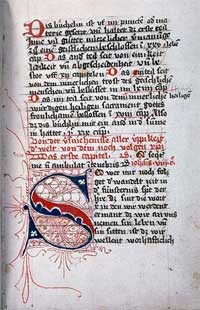The Meaning of Kyrie Eleison
St. Symeon of Thessaloniki writes about the Kyrie Eleison prayer: “ ‘Have mercy upon us, O God, according to your great mercy, we beseech you … ‘ This expression is appropriate, since we should not ask for anything except for mercy, as we have neither boldness nor access to offer anything as our own … So as sinners and condemned through sin we cannot, nor dare not, say anything to our Loving Master except ‘have mercy.’ “
The excellent book “Orthodox Worship” describes the meaning of the word mercy as follows:
“The word mercy in English is the translation of the Greek word eleos. This word has the same ultimate root as the old Greek word for oil, or more precisely, olive oil; a substance which was used extensively as a soothing agent for bruises and minor wounds. The oil was poured onto the wound and gently massaged in, thus soothing, comforting and making whole the injured part. The Hebrew word which is also translated as eleos and mercy is hesed, and means steadfast love. The Greek words for ‘Lord, have mercy,’ are ‘Kyrie, eleison’ that is to say, ‘Lord, soothe me, comfort me, take away my pain, show me your steadfast love.’ Thus mercy does not refer so much to justice or acquittal a very Western interpretation but to the infinite loving-kindness of God, and his compassion for his suffering children! It is in this sense that we pray ‘Lord, have mercy,’ with great frequency throughout the Divine Liturgy.”*
From the Liturgy
I share with you the following prayer from the liturgy because it reminds us that God’s awesomeness, His majesty and His power are exceeded only by His mercy:
“O Lord our God, Whose power is unimaginable and Whose glory is inconceivable, Whose mercy is immeasurable and Whose love for mankind is beyond all words, in Your compassion, Lord, look down on us and on this holy house, and grant us and those who are praying with us the riches of Your mercy and compassion. For to You are due all glory, honor and worship, to the Father and to the Son and to the Holy Spirit, now and ever and unto ages of ages.”
From the Scriptures
Think of the people who approached Jesus with this simple prayer, “Kyrie eleison”, “Lord, have mercy”:
The Canaanite woman whose daughter was tormented by a devil. She persisted in her plea for mercy until her daughter was healed.
The man whose son was possessed by an evil spirit that threw him into the fire. He came to Jesus with the plea Kyrie eleison. The prayer was answered and his son was healed.
The two blind men sitting by the road outside Jericho who cried out to Jesus, Kyrie eleison. That cry was heard by Jesus who healed both of them.
A final example. Jesus is left alone with the adulteress. Misery is left alone face to face with mercy. And she hears from the mouth of Jesus the words, “Neither do I condemn thee. Go and sin no more.” That is God’s mercy!
In all these instances Kyrie eleison was not a prayer that people recited unthinkingly and mechanically, but a cry of sincere faith that came from their hearts, a cry of desperate need and dependence on Jesus. Such a prayer God will not despise.
Not What We Deserve
A precious story pictures a mother pleading with Napoleon to spare her condemned son’s life. The emperor said the crime was dreadful; justice demanded his life. “Sir,” sobbed the mother, “Not justice, but mercy.” “He does not deserve mercy,” was the answer. “But, sir, if he deserved it, it would not be mercy,” said the mother. “Ah yes, how true,” said Napoleon. “I will have mercy.”
We dare not stand before the throne of God and ask that we be given what we deserve. Our only cry is, “Lord, be merciful.” And the miracle is that there is mercy. At the very heart of the universe beats the heart of God’s love. “I tell you,” said Jesus about the publican, “this man went down to his house justified rather than the other.”
Not My Rights
C. S. Lewis tells an interesting story in his book “The Great Divorce.” A busload of ghosts is making an excursion from hell up to heaven with a view of remaining there permanently. They meet the citizens of heaven and one very big ghost from hell is astonished to find there a man, who on earth, had been tried and executed for murder.
“What I would like to know,” he explodes, “is what are you doing here, you a murderer, while I a pillar of society, a self-respecting decent citizen am forced to walk the streets down there in smoke and fumes and must live in a place like a pigsty.” His friend from heaven tries to explain that he has been forgiven, that both he and the man he had murdered have been reunited before the judgment seat of Christ. But the big ghost from hell replies, “I just can’t buy that!” “My rights!” he keeps shouting, “I have got to have my rights the same as you!” “Oh no!” his friend from heaven keeps reassuring him, “It’s not as bad as all that! You don’t want your rights! Why, if I had gotten my rights, I would never be here. You’ll not get your rights, you’ll get something far better. You will get the mercy of God.”
This is why we pray so often in the liturgy: “Lord, have mercy.” This prayer, uttered with the least particle of faith, will open the way for God’s forgiveness and for the coming of His kingdom in our hearts.
Another one of the most precious prayers of the Orthodox Church the Jesus Prayer claims nothing but God’s mercy: “Lord Jesus, Son of God, have mercy on me, the sinner.”
St. Isaac the Syrian said once:
“Never say that God is just. If he were just you would be in hell. Rely only on His injustice which is mercy, love and forgiveness.”
“Have mercy upon me, O God … according unto the multitude of thy tender mercies blot out my transgressions.” (Ps. 51.1)
What You Need Is Mercy
Once a woman hired an artist to paint her portrait. When he finished it, the woman complained that the portrait didn’t do her justice. The artist laughed and said, “Lady, you don’t need justice. You need mercy.”
One man said, “This is what I felt Jesus was saying to me as He looked down from the cross. He said, ‘You don’t need justice. You need mercy. Here is the mercy you need. It’s being poured out for you by the love of God. In spite of your tainted past, God loves you and wants to cleanse you.’ ”
Let us then with confidence draw near to the throne of grace, that we may receive mercy and find grace to help in time of need (Heb. 4.16).
“Why Should I Let You into Heaven?”
What if you die and appear before God. And this can happen at any moment since we are but a heartbeat away from Him. And God asks you, “Why should I let you into heaven?” What would you say?
One person replied, “Like the publican I would fall to my knees, beat my breast, and with my eyes cast on the ground, I would plead, ‘Lord, be merciful to me, the sinner.’ ”
Or, I would say as the prodigal did in the Gospel lesson, “Father I have sinned against heaven and before you; I am no longer worthy to be called your son; treat me as one of the hired servants.”
“Even if we reach the summit of virtue, we are saved only by God’s mercy,” said St. John Chrysostom.
But God who is rich in mercy, out of the great love with which He loved us, even when we were dead through our trespasses, made us alive together with Christ (by grace you have been saved) and raised us up with Him, and made us sit with him in the heavenly places in Christ Jesus. (Eph. 2:4-6).
Be Merciful as God Is Merciful
We cannot pray for mercy without being willing to extend mercy to others. That is the point of Jesus’s parable about the two debtors (Matt. 18:23-35). Matthew uses a form of the same Greek word eleison in presenting Jesus’ teaching, “Should you not have had mercy on your fellow servant, as I had mercy on you?”
The mercy we ask for is the mercy we must give to others. Lord, have mercy and make us merciful.
A dying Christian was asked on his death bed, “Are you going to receive your reward?” “No, no!” he breathed. “I go to receive not my reward but God’s mercy.”
Prayer from the Triodion
“As the Prodigal Son I come to Thee, merciful Lord. I have wasted my whole life in a foreign land; I have scattered the wealth which Thou gavest me, O Father. Receive me in repentance, O God, and have mercy upon me.”


















